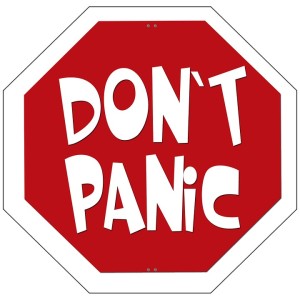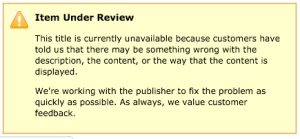 You have probably already heard about the latest sky-is-falling report involving KDP. An online publication (which shall remain nameless, as it’s well-known for publishing unsubstantiated clickbait, but whose initials are Good Ereader) struck fear into the hearts of many indie authors last week, when it announced that starting February 3rd, Amazon would begin pulling from sale any eBooks reported to have typos or formatting issues.
You have probably already heard about the latest sky-is-falling report involving KDP. An online publication (which shall remain nameless, as it’s well-known for publishing unsubstantiated clickbait, but whose initials are Good Ereader) struck fear into the hearts of many indie authors last week, when it announced that starting February 3rd, Amazon would begin pulling from sale any eBooks reported to have typos or formatting issues.
Actually, KDP has reserved that power unto itself since at least 2010, according to Nate Hoffelder at The Digital Reader. What’s happening now is that Amazon is instituting a two-tier system. Books that are basically unreadable, or are flagrant violations of KDP’s terms of service, will be pulled from sale. Books that include so many errors and/or formatting issues that they detract from the reader’s enjoyment will get a warning message on their listing; Amazon will then contact the publisher (if you’re an indie author, that’s you) with a list of the problems that need to be fixed. Once they’re fixed to the Zon’s specifications, your book will be available for sale again.

Some authors are worried they’ll be targeted by some reader who doesn’t like them, or who doesn’t like their book. While that’s a possibility, John Doppler at Words on Words spoke to a couple of Amazon customer service reps and learned the Zon has actual humans reviewing the complaints. Your antagonist would have to offer up complaints specific enough for the reviewer to check, and egregious enough to pass them on to you. “He’s a horrible person who should never be allowed to earn money from anything he writes” isn’t going to be enough to get your book pulled.
Other authors are worried that somebody will flag their made-up words, dialect, or un-American spelling. On the KDP page listing the things for which it will pull your book from sale, KDP specifically states: “Sometimes improper or dialectic spellings are intentionally used by the author. These are not considered errors. Common examples would include character dialogue. Spelling differences which occur between US and British English are not considered errors.” So if you’re a British author who’s worried some American will complain to Amazon about your extra “u”s, be assured that alone won’t be enough to get an error warning slapped on your book listing.
Really, though, authors and publishers can avoid much of the risk of having Amazon pull your book by using common sense when a book is first uploaded to KDP. Look at the book in the previewer (you have many options): Has KDP’s bot flagged a lot of typos? Are you seeing gibberish in places (a clear sign that you’ve used a special character that KDP’s converter can’t read)? Did you manage somehow to italicize a whole section or chapter (an indication that your formatter forgot to close an HTML tag)? Have you cut-and-pasted graphics, instead of using Word’s Insert function? Did you forget to replace links to your books on Smashwords (or D2D or – horrors! – iBooks) with Amazon links?
We’ll be keeping an eye on this. If you’ve had a recent run-in with Amazon over this new policy, please let us know in the comments.

Thank you for clearing this up. I read and re-read and have a few readers all to pick out typos. Once in a while one will get through regardless. I know of other indie authors with the same issue. I’d hate to have a book pulled due to one typo.
If one or two typos would do it, Carole, all of my books would have been bounced — and so far, none has. (And I hope I didn’t just tempt fate by typing that…)
Thanks, Lynne. Pinned & shared. 🙂
Thank you, Linda! 🙂
That is exactly how I have experienced it. I use the “previewer” and they will flag an occasional word. But it gives me the option of declining the correction. It has never been an problem.
It hasn’t been a problem for me, either, Yvonne. In thinking about it, I’m wondering whether some of this terrible content wasn’t uploaded before KDP instituted the previewer.
Thank you for this reassurance. I was wondering if a cranky reader could find the two or three typos I know still exist and make my life miserable with them. I predict the real catches will be a bunch of backlist titles that publishers have scanned in without proofreading. My ebook reading of “Staggerford” was a horror — imagine every “die” turned into “the.” And that in a book in which death was a major theme.
Ouch. 🙁 What I hope is that Amazon scrutinizes trad books the same way they’re looking at indie titles. I know at least one trad publisher was outsourcing their OCR-and-corrections for backlist titles to India, and many of those projects came back in horrible shape.
Happened to me last week. Got an email from KDP saying that one of RHP’s books had been reported as having “too many errors” or whatever their preferred sentence was – you know, the sentence with many errors… They also said they’d checked, and the customer was right.
Right.
So *I* checked. Nothing. Nada. Okay, okay, one margin in the table of contents – a non-fiction book – was a little wonky, but it was certainly readable.
I thought about all of the books I’ve seen there that are simply atrocious in both editing and formatting, and I got even more irritated. KDP also has a bad habit of sending your responses to different people each time, so I figured it would be a long, drawn-out process.
Surprisingly, it wasn’t. I got an email back with a couple hours that said, “Okey dokey, then, we won’t bother you again. Your book is just fine the way it is!” That book that has been in print/Kindle for three years…
Thanks for the testimonial, Robin. And I’m glad to hear the dispute was resolved quickly and easily. 🙂
Good to hear common sense on this. I was ‘trolled’ by a reader on a site that shall remain nameless but which is known for its problems with trolling and bullying and which is owned by Amazon ( I think pretty well everyone will know the site from that description ). Basically, this person used the trick of putting a small kernel of truth ( largely irrelevant and which no one else apparently saw a problem with ) into an otherwise bogus piece. To simply read this piece and decide on it, you could be forgiven for thinking some awful things but take one look at the book and you’d know it was bogus. It’s good to know that it is humans reviewing KDP complaints for authenticity because this kind of lets-destroy-the-career-of-an-author trolling does still go on.
I know it does, Devon, and I’m sorry you got caught up in it. Makes you wonder how some folks have so much time on their hands, doesn’t it? (shakes head sorrowfully)
Thanks for all the info. I’ll be checking even more fanaically now.
Oops! Should have proofread the above! I meant fanatically, of course.
Could’ve been an amalgamation of fanatically and maniacally… 😉 Thanks, Helen.
I actually support Amazon in this. There are too many scrappy, self-published (and professionally-published) eBooks out there, as it is so easy to upload any old junk produced overnight and fueled by Red Bull.
It’s a shame they can’t filter-out based on quality, too, but I guess that’s subjective (sigh).
There’s only so much they can do about quality, Andy. 😉
Maybe I’m old fashioned, but I’ve never had a problem with rules and regulations that clearly benefit the common good, and Amazon’s crack down on poor quality ebooks is just that – an effort to raise the quality of reading material for everyone, including authors.
The only time my internal anarchist bares her teeth is when a rule is for the benefit of one segment of society alone. This is not the case here, and the sky most definitely is not falling. 🙂
Agreed! Just think — if the vast majority of poorly edited, poorly formatted, and just generally awful books were culled from Amazon’s offerings, maybe readers would stop talking about how terrible indie books are. 😉